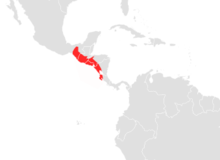Gray short-tailed nose
| Gray short-tailed nose | ||||||||||||
|---|---|---|---|---|---|---|---|---|---|---|---|---|
| Systematics | ||||||||||||
|
||||||||||||
| Scientific name | ||||||||||||
| Carollia subrufa | ||||||||||||
| ( Hahn , 1905) |
The gray short-tailed leaf-nosed bat ( Carollia subrufa ) is a species of bat from the leaf-nosed family (Phyllostomidae), which is native to Central America.
description
The gray short-tailed blade nose is a small bat with an average head-trunk length of 68.5 mm and a weight of 15 g. Like all short-tailed leaf noses , their fur is also of a brownish color without any fur pattern. The belly is relatively light, and the fur is sparse than in other species of this genus. The hair is clearly three-colored, with a dark base, a light center section and a brown tip. The ears are medium-sized and slightly pointed. Like most representatives of the leaf noses , it also has a pronounced nasal blade. On the lower lip there is a central wart, which is surrounded in a U-shape by smaller warts. The tail is short and the calcar shorter than the foot. The flight skin is mostly of a dark, greyish brown.
Way of life
The gray short-tailed leaf nose hangs in caves, empty wells, hollow trees and abandoned buildings during the day. Together with it, other bat species such as Macrophyllum macrophyllum and Glossophaga soricina can often be found in the hanging places , but the gray short-tailed nose seems to avoid the company of its sister species, the spectacle-shaped nose . It feeds on fruits, nectar and insects. She can be pregnant all year round.
distribution and habitat
The distribution of the lens nose extends from southern Mexico to north-western Costa Rica . Their population is classified by the IUCN as stable and harmless thanks to their widespread distribution and their occurrence in protected areas.
literature
- J. Ortega, B. Vite-De León, A. Tinajero-Espitia, JA Romero-Meza (2008): Carollia subrufa , Mammalian Species, No. 823. pp. 1-4
